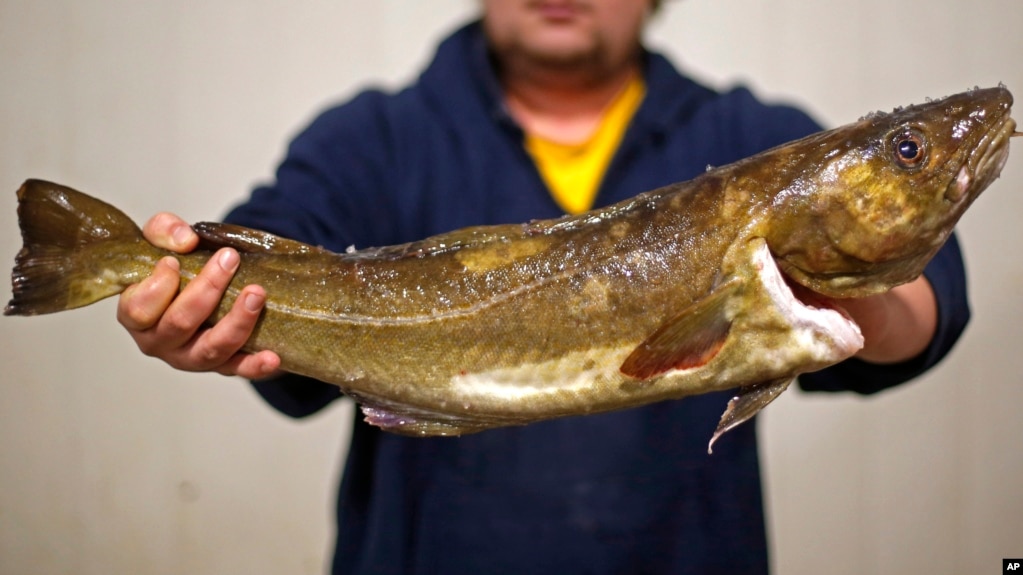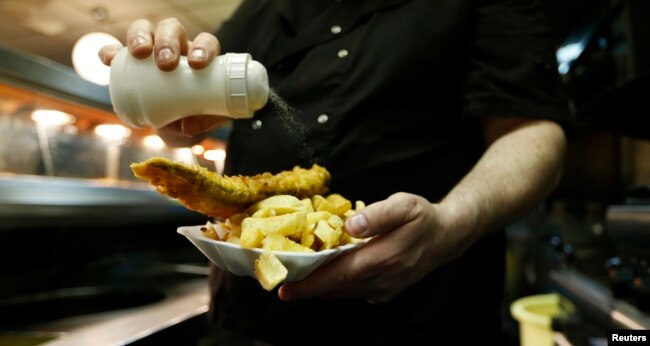
FILE – This Oct. 29, 2015 file photograph shows a cod to be auctioned off in Portland, Maine. Many people are concerned about the cost of fish as restrictions on trade with Russia go into effect. (AP Photo/Robert F. Bukaty)
The world’s seafood industry is preparing for higher prices, supply problems and possible job losses as restrictions make products from Russia less available.
Experts say the continued restrictions meant to punish Russia, known as sanctions, will also affect the cost of fish in the U.S. and other countries.
Russia is one of the world’s top producers of the ocean fish called cod. It also supplies other seafood like crab and Alaska pollock.
Glen Libby is an owner of Port Clyde Fresh Catch, a seafood market in the U.S. state of Maine. If a seafood company gets cod from Russia, he said, the situation is “quite a mess.”
The Associated Press said federal data shows that $50 million of Russian seafood products passed through Portland, Maine in 2021. Russia sent 12.7 million kilograms of cod to the United States during a two-year period ending in January 2022 AP reports.
In addition, other nations that import a lot of fish, such as Japan, will see higher prices as the supply from Russia is reduced. Europe and Britain also depend on Russia for fish.
Andrew Crook is the head of a trade group in Great Britain called the National Association of Fish Friers. He described the situation this way: “We are in real dire straits” because of rising fish and energy prices.

He predicted about 30 percent of the fish and chips stores in Britain would go out of business this year. Fish and chips is a traditional British meal of fried fish and potatoes.
He told British broadcaster ITV: “We’re a massive part of U.K. culture and it would be a shame to see that go.”
In the U.S., one expert said people who like to eat fish will see higher prices and fewer choices.
Kanae Tokunaga is an economics researcher in Maine. Tokunaga said even fish that do not come from Russia will be more costly “because seafood is a global commodity.”
The U.S. depends on cod from other countries because it is harder for Americans to catch that kind of fish than it used to be. In the early 1980s, fishermen in the northeastern U.S. caught about 45 million kilograms of cod each year. Now, restrictions meant to preserve the fish population limit the catch to 900,000 kilograms.
Ed Markey is a U.S. senator from Massachusetts. He said seafood workers in his state are worried about losing their jobs.
Walt Golet is an assistant professor of Marine Sciences at the University of Maine. He said the U.S may be able to bring in a little more fish from Canada and Norway.
But a shortage of traditional species of fish may have one good effect, said Ben Mertens. He runs the Maine Coast Fishermen’s Association.
He said it may be time for the fish business to start harvesting fish they used to leave in the water.
If sanctions are “going to disrupt supply chains, it does present an opportunity for other species…” he said.
I’m Dan Friedell
Dan Friedell adapted this story for VOA Learning English based on a report by the Associated Press.
Are you seeing increased food costs where you live? What items are now more costly? Write to us in the Comments Section and visit WWW.VOA-STORY.COM
______________________________________________________________
Words in This Story
a mess –n. a situation that is very complex and difficult to deal with
dire straits –expression: a difficult position
a shame – n. something that you would not want to do; something regrettable
global – adj. involving or affecting the whole world
commodity– n. something that is bought and sold regularly in large amounts that is an important product
species– n. a group of animals or plants that are similar and can produce young animals or plants
disrupt– v. to cause (something) to be unable to continue in the normal way; to interfere with the normal progress or activity of (something)
supply chain– n. the whole system through which products go from producer to user